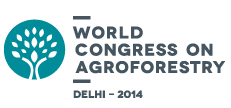Cultivating resilient landscapes – opportunities for restoring degraded and vulnerable lands with agroforestry systems
Cultivating resilient landscapes - opportunities for restoring degraded and vulnerable lands with agroforestry systems
wca2014-1292 Matilda Palm 1,*Eskil Mattsson 1 1Energy and Environment, Chalmers University of Technology, Gothenburg, SwedenShifts in global land use have led to loss of biodiversity, land degradation and declines in ecosystem services. In many geographical areas the deterioration is currently at a near catastrophic scale and the impact is huge, both in terms of food production and deforestation. If managed correctly ecological restoration can offer a chance to reverse environmental degradation as well as help mitigating climate change.
This study identifies such opportunities by analysing how an expansion of agroforestry management onto degraded land may restore productivity and ecosystem services. Using reforestation as a restoration alternative has been widely recognized, however, the provision of ecosystem services may be limited. In contrast, agroforestry offers the possibility to generate a wide variety of both environmental and socioeconomic benefits, and through that also a higher potential of success. With a combination of qualitative and quantitative approaches the project captures a broad spectrum of drivers of degradation as well as possibilities to overcome obstacles that hinders restoration. The study includes a comprehensive assessment of opportunities and risks associated with ecological restoration of degraded land. More specifically, the aim of the study is to propose practical solutions for restoration of degraded land with a focus on multiple ecosystem services. The results and recommendations will be based on comparative field research from Sri Lanka and Vietnam.

